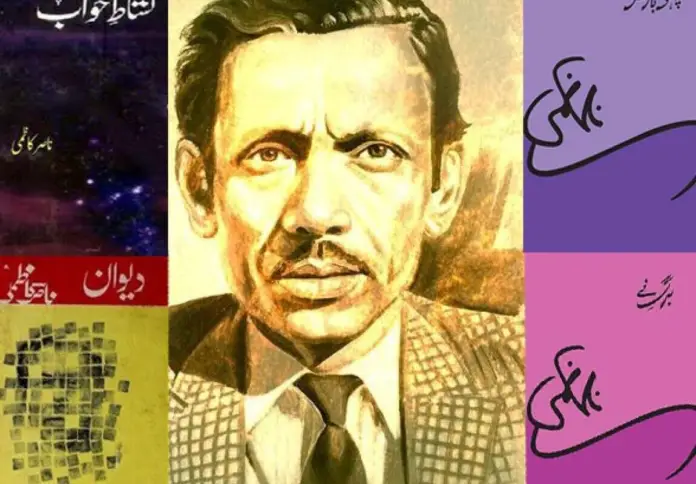Daaim aabaad rahegi duniya.
Hum na honge koi hum sa ho ga
(The world will remain flourishing permanently
We will not be there, someone like us there will be)
This is a tale of 1942. A mushaira was organized by All India Radio at Islamia College Lahore. Abid Ali Abid was presiding and many renowned poets of India were present in it.
But during the mushaira, a 17-year-old youth recited a ghazal in a mild voice and even milder note which forced everybody to be amazed.
Hoti hai tere naam se vahshat kabhi kabhi
Barham hui hai yoon bhi tabiyat kabhi kabhi
Ae dost hum ne tark-e-muhabbat ke bavajood
Mehsoos ki hai teri zaroorat kabhi kabhi
(Sometimes of your name I am frightened
Like this too the displeasure of my mood is heightened
O friend despite relinquishing my love, I
Have felt sometimes that my desire is freshened)
Something at least of the youth of the poet, sad tone, sad ambience and classical beauty, along with a novel thought. As if a proclamation was made in the city that a new poet has appeared.
This was Nasir Kazmi, who died 50 years ago today in Lahore and who gave a confidence to melody in the 20th century and overturned the opinions of all critics about the ghazal upon themselves. How much of an easy task it appears to be, is absolutely absolutely not so. At this difficult time, Nasir turned towards the Khuda-e-Sukhan (God of Poetry), Mir Taqi Mir, and learnt three things.
The first that the attention should be upon the earth rather than the sky meaning the atmosphere in which one breathes should feel breathing in one’s poetry. The greatest experience in the age of Nasir and till now even was the ‘partition’. Nasir himself too migrated and the destruction he saw as a result of that, he expressed with such an art that it was left as a collective experience.
A responsibility of great art is too that it captures the zeitgeist in words with such expertise that you very much cannot understand that period without ignoring it. In the West, T.S. Eliot’s The Wasteland is the best example of this. If anyone made migration a civilizational experience in Urdu poetry, who is that except Nasir Kazmi? Surprisingly, an acclaimed scholar like Shamsur Rahman Faruqi ignoring this aspect spoke his mind by labeling Nasir as merely a poet of the tragic tone of love and passion. The nostalgia of Nasir is not personal but civilizational. See a few verses of a ghazal each of Deevan (Collection) and Barg-e-Nai (Melody of the Flute). Does this attitude feel like bursting from the failure of personal love?
Pattiyan roti hain sar peet-ti hain
Qatl-e-gul aam hua hai ab ke
Shafaqi ho gai deevar-e-khayal
Kis qadr khoon baha hai ab ke
(The petals are crying, engaged in lamentation
At this time, common has become the flowers’ assassination
So much blood has shed at this time
Red has become the wall of imagination)
Zameen logon se khaali ho rahi hai
Yeh rang-e-aasman dekha na jaye
Purani sohbaten yad aarahi hain
Charaghon ka dhuan dekha na jaye
(The earth is being depopulated
With this colour of the sky I cannot be comforted
The old friendships are being recollected
With the smoke from the lamps, I cannot be comforted)
The second thing Kazmi learnt was to make experience and observation a feeling so that one’s matter can become the matter of all. It is possible that sadness may affect two people and definitely the reason for the sadness of both will be different, but the reaction and state of the heart resulting from it would definitely be similar. If the poet begins to narrate this experience, why would the other be interested, but if the poet can express the condition bursting from experience successfully, then we will definitely give him a place in our heart.
Nasir had said while clarifying this very beautifully that when you open a bottle of perfume, then the garden and flowers cannot be sighted in it, rather their fragrance is found there. The working of this element is the greatest in the popularity of Nasir. Zafar Iqbal too could not help but admit this that, ‘I do not remember as many of my own verses as I do of Nasir’s’. The reason for this is the extreme joining with life and the expression of the everyday feelings in simple language. Experiences change but basic human behaviours more or less remain the same and Nasir is the poet of these very behaviours.
The third important thing which Nasir learnt from Mir is the art of employing words. Words are very much the colours with which the poet makes a picture, therefore, the whole verse to a great extent depends upon the manner of words. In the matter of words, one will very rarely encounter such an informed person as Nasir. In poetry, if apparently harmless words as ke (that), hee (only/even), bhi (too), sa (very), magar (but), khair (well), yoonhi (in this very manner), etc. are not used correctly then they are the most damaging. How Nasir casts a spell with these ordinary words, let’s see a few verses:
Tere aane ka dhoka sa raha hai
Diya sa raat bhar jalta raha hai
Suna hai raat bhar barsa hai badal
Magar voh shahr jo pyasa raha hai
(A suspicion remained regarding your arrival
All night long did burn the candle
One hears that it rained all night
But in case that city thirsts despite the drizzle)
Apni be-chaini bhi ajab thi
Tera safar bhi naya naya tha
Teri palken bojhal see theen
Main bhi thak kar choor hua tha
Tere hont bhi khushk hue the
Main toa khair bohat pyasa tha
Dil ko yoonhi sa ranj hai varna
Tera mera sath hee kya tha
(How strange was my anxiety
You too had embarked on the journey recently
Your eyelids were a bit heavy
I too was dog-tired
Your lips too had become dry
As for me, well I was really thirsty
My heart is sad in this very manner else
We were not meant for each other’s company)
Deevangi-e-shauq ko yeh dhun hai in dinon
Ghar bhi ho aur be-dar-o-deevar sa bhi ho
(These days the frenzy of desire is in a state of such inclination
Without a door and wall it be so, but then it should also be a habitation)
When Nasir began with the ghazal in the decade of the 1940s, in those times the initial collections of Miraji, Faiz and Rashid came to the fore and these same poets continue to be prominent till now, but the decade of 1950s and 1960s is the era of the full return of the ghazal. In the 1950s after Nasir, on one hand the new ghazal of Zafar Iqbal, Shahzad Ahmad and Saleem Ahmad became famous; on the other hand, Ahmad Mushtaq was seen writing a ghazal abounding with the condition of a gentle tone. Very few ghazals appear in the first two collections of Munir Niazi but gradually the quantity of ghazals began to increase. In the 1960s, the collections Aab-e-Ravan (‘Flowing Water’, Zafar Iqbal) and Dushmanon ke Darmiyan Sham (‘An Evening Among Enemies’, Munir Niazi) were the expression of the confidence of new poets upon the ghazal. In this same period, Shakeb Jalalai startled with his revival but another important event or accident was very much the linguistic formations.
The ghazal had just begun to stand firm that many poets began to gasp from the wind of linguistic formations. This time was hard for both the ghazal and Nasir. What a difference between that period of 1949 that Muhammad Hasan Askari had announced the arrival of a poet in the shape of Nasir and this time that the ‘professional critics’ began to indicate the end of the matter for Nasir.
The tone of Nasir is soft and the condition is of staying. With Zafar Iqbal and Shakeb, the lines of couplets are strong and the expression is more open, that is why too, to some people, the lustre of Nasir began to appear faded. But the poetry of Nasir possesses the mystery of brown beauty whose mark is faint but influence is very long-lasting. A lot of time too had passed since the second poetic collection of Nasir but as soon as Deevan was published after Nasir’s death, the ‘critics’ were struck dumb. One must praise Faruqi’s honesty that while acknowledging he not only changed his stance but was seen to be stating to the degree that had Nasir not written ghazals, then the ghazal would have had to wait for him.
The behavior of the progressives towards Nasir and poetry was the same. A poet like Nasir would appear devoid of political and social consciousness to them in that here there was not a slogan but poetry, not insipid and single-meaning line-making, but classical beauty. The most representative poets of the progressives became drawing-room poets but Nasir is still the poet of every street. Whatever mould is attempted to enclose Nasir will be a failure in that with him social behaviours are found in such a dissolved shape that it is not possible to separate their ingredients. When Nasir wrote about East Pakistan, talking about the fishermen and singers upon the coasts, he even made that a full civilizational behaviour. That is why it is still fresh. These ghazals are the best evidence of Nasir’s deep joining with nature and folk culture.
Pehli Barish (First Rain) was another jump of Nasir whose revival, images and creative abundance is self-evident even today. Nasir supplied a model on a practical basis in that how creative experiment, symbolic language and praise of the beloved’s physical charms in verse is carried out. After all, was it in any other poet’s control to create such a world of innovation and beauty?
Tere ghar ke darvaze par
Sooraj nange paon khada tha
Deevaron se aanch aati thi
Matkon mein pani jalta tha
Dhoop ke lal hare honton ne
Tere balon ko chooma tha
Mathe par boondon ke moti
Aankhon mein kajal hansta tha
Chandi ka ik phool gale mein
Hath mein badal ka tukda tha
Bheege kapdon ki lehron mein
Kundan sona damak raha tha
Ik rukhsar pe zulf giri thi
Ik rukhsar pe chand khula tha
Thodi ke jagmag sheeshe mein
Honton ka saaya padta tha
Chandar kiran si ungli ungli
Nakhun nakhun heera sa tha
Ik paon mein phool si jooti
Ik paon sara nanga tha
(At the door of your home
The sun was standing barefoot
Heat came from the walls
Water burnt in the jars
The red green lips of the sunlight
Had kissed your hair
The pearls of drops upon the forehead
The kohl laughed within the eyes
A silver flower around the neck
A piece of cloud in hand
In the waves of the damp clothes
Pure gold was glittering
Upon one cheek a lock was falling
On another the moon was spreading
In the shining glass of the chin
The shadow of the lips fell
Every finger like a moonbeam
Every nail like a diamond
In one foot a flower of a slipper
The other was all bare)
Today 50 years have passed since Nasir Kazmi passed away. Nasir not only smoothed the ground of the ghazal but also accomplished and demonstrated his success by raising a building whose height no second poet has till now touched after him. After Nasir, whatever experiments happened in the ghazal would never have taken place had Nasir not supplied such a strong foundation. Even today the ghazal is our strongest style of expression at whose back the most important event is the presence of Nasir. The chessboard which Nasir laid, many pawns arrived upon it, but Nasir still stands in the form of the king.
Fursat mein sun shaguftagi-e-ghuncha ki sada
Ye voh sukhan nahi jo kisi ne kaha bhi ho
(At leisure listen to the sound of the bud’s happy countenance
These are not the words which too were spoken, perchance)
All the translations from the Urdu are by the writer.







